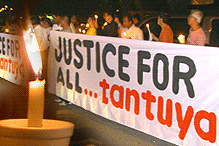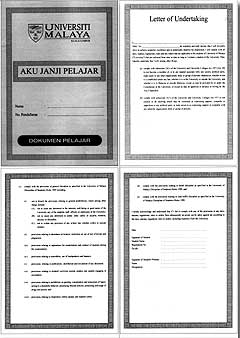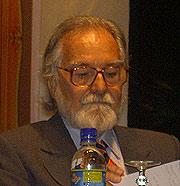The current interest in talking about sedition is exciting. I think Malaysians, especially avant-garde Bangsar Malaysians, are discussing the difference between ‘sedition’, ‘sedation’, ‘seduction’ and ‘sadistic-nation’.
But the word ‘sedition’ is making me confused. Is it ‘sedition’ or ‘sedation’? One is legal, one is medical. One connotes ‘talking bad about others and about systems’, the other connotes ‘"putting others to sleep’ using medication.
 Although I am not a lawyer I have a deep interest in the philosophical basis of law. My interest (among other fields) lies in philosophy and its possibilities for the creation of a republic of virtue wherever we are: in Raja Petra's Malaysia, in Mugabe's Zimbabwe, or in the late Altantuya's Mongolia.
Although I am not a lawyer I have a deep interest in the philosophical basis of law. My interest (among other fields) lies in philosophy and its possibilities for the creation of a republic of virtue wherever we are: in Raja Petra's Malaysia, in Mugabe's Zimbabwe, or in the late Altantuya's Mongolia.
My interest is in how words get used or abused and how they perform action in society and how they even transform ‘social relations of production’ and ‘inscribe ideology and institutions’ onto the landscape of humanity.
In fact this is the theme I explored in a doctoral dissertation at Columbia University New York. I wanted to find out the genealogy, the archeology, the complexity, the historical-materiality, and the post-structurality of language.
I wanted to see the dimensions of words and concepts, who defines what is defined and how words get to be defined. I also wanted to investigate how words can be oppressive and how those in power use words to mesmerise people, to make a living, or even to lie in political campaigns.
 I have been fascinated by words since I was a child. Travelling on a bus from Johor Bahru to Singapore, on a train from Johor Bahru to Bukit Mertajam, on a barge from Johor Bahru to Kuantan, or in a taxi around Kuala Lumpur, I would notice names of roads, road signs and billboards - and wonder what those words mean. My mind would wonder, constructing images.
I have been fascinated by words since I was a child. Travelling on a bus from Johor Bahru to Singapore, on a train from Johor Bahru to Bukit Mertajam, on a barge from Johor Bahru to Kuantan, or in a taxi around Kuala Lumpur, I would notice names of roads, road signs and billboards - and wonder what those words mean. My mind would wonder, constructing images.
Even now, travelling from New York to Boston or Philadelphia, my mind interprets names of townships and figures out their origin - Spanish, German, Dutch, French, British, Lenape, Iroqui, Cherokee, Sioux, or any of the early Indian tribes. A good way to teach children about words is to get them to notice signbaords and let their imagination run wild.
‘Just sign it’
When I lived in northern Malaysia, teaching Thinking Skills and Ethics in Malaysia's foremost management university, I still had a child-like mind in thinking about words.
 One word that fascinated me is of course
Akujanji
, which has become public enemy word No.1 for students and lecturers, but a good friend of many a vice-chancellor and their political masters.
One word that fascinated me is of course
Akujanji
, which has become public enemy word No.1 for students and lecturers, but a good friend of many a vice-chancellor and their political masters.
In the word, Akujanji contains the legal and political implication of turning students and lecturers into automatons by silencing and sedating them into supporting any leader however corrupt and abusive he may be.
I now wonder if the word is going to be expunged from our consciousness should there be a regime change in the next general election. Akujanji is an allergic word that we need to detoxify. A word that is not only a sedative but also seditive if you choose to question its practical use. You will lose your job if you choose not to kowtow to those who impose the word on you.
‘Sign it... sign it... just sign it....all of us had to sign it… even if the last two clauses of the Surat Akujanji are questionable... you are not allowed to ask any questions or you will be dismissed…,’ as many a Registrar of a university would say.
‘Just sign it... as we actually do not have an explanation on how one's Constitutional Rights will still be protected...,’ as many a vice-chancellor would agree.
‘If you don't like what we are doing, leave or don't come home. We are a university, like many others, that will always support the government and promote the ideology of Ketuanan Melayu (even if we are ‘educating Malaysians of all races’) and we will silence anyone who is working against our idea of what a university is.’
Defining ‘sedition’
Some definition can help us in understanding this national issue concerning the Sedition Act. I have used the Compact Oxford English Dictionary to help me locate the definitions:
Sedition ( hasutan in Malay):
• noun conduct or speech inciting rebellion against the authority of a state or monarch
- Derivatives: seditious adjective seditiously adverb
- Origin Latin, from sed- 'apart' + itio 'going'
Sedation ( dibiuskan in Malay)
Notice that ‘sedation’ does not have a good Malay equivalent. I am using the word bius as a Johor pasar word that is familiar to kampong folk. We borrowed the act of sedating, using the Sedition Act, from the British colonials. It is also a borrowed concept from the English language from the medical profession.
• noun: the administering of a sedative drug to produce a state of calm or sleep
- Origin Latin, from sedare 'settle'
From an entry by the Human Rights Watch:
The Sedition Act, originally enacted by British colonial authorities, limits free expression by broadly criminalising any speech that is judged to have a "seditious tendency," including speech which tends to "bring into hatred or contempt or to excite disaffection against" the government, promote "feelings of ill-will and hostility between different races," or question constitutional preferences in business, education, and government employment opportunities given to Malays and natives of Sabah and Sarawak. The speaker's intent and the statements' veracity are irrelevant. A violation of the act is punishable by up to three years in prison, a RM 5,000 fine or both. …
From an entry in Wikipedia:
Section 4 of the Sedition Act specifies that anyone who "does or attempts to do, or makes any preparation to do, or conspires with any person to do" an act with seditious tendency, such as uttering seditious words, or printing, publishing or importing seditious literature, is guilty of sedition. It is also a crime to possess a seditious publication without a "lawful excuse".
The Act defines sedition itself as anything which "when applied or used in respect of any act, speech, words, publication or other thing qualifies the act, speech, words, publication or other thing as having a seditious tendency".
Under section 3(1), those acts defined as having a seditious tendency are acts with a tendency:
a) to bring into hatred or contempt or to excite disaffection against any Ruler or against any government;
(b) to excite the subjects of the Ruler or the inhabitants of any territory governed by any government to attempt to procure in the territory of the Ruler or governed by the government, the alteration, otherwise than by lawful means, of any matter as by law established;
(c) to bring into hatred or contempt or to excite disaffection against the administration of justice in Malaysia or in any State;
(d) to raise discontent or disaffection amongst the subjects of the Yang di-Pertuan Agong or of the Ruler of any State or amongst the inhabitants of Malaysia or of any State;
(e) to promote feelings of ill-will and hostility between different races or classes of the population of Malaysia; or
(f) to question any matter, right, status, position, privilege, sovereignty or prerogative established or protected by the provisions of part III of the Federal constitution or Article 152, 153 or 181 of the Federal Constitution.
 Section 3(2) provides certain exceptions, providing examples of speech which cannot be deemed seditious. It is not seditious to "show that any Ruler has been misled or mistaken in any of his measures", nor is it seditious "to point out errors or defects in the government or constitution as by law established".
Section 3(2) provides certain exceptions, providing examples of speech which cannot be deemed seditious. It is not seditious to "show that any Ruler has been misled or mistaken in any of his measures", nor is it seditious "to point out errors or defects in the government or constitution as by law established".
It is also not seditious "to attempt to procure by lawful means the alteration of any matter in the territory of such government as by law established" or "to point out, with a view to their removal, any matters producing or having a tendency to produce feelings of ill-will and enmity between different races or classes of the population of the Federation".
However, the act explicitly states that any matter covered by subsection (1)(f), namely those matters pertaining to the Malaysian social contract, cannot have these exceptions applied to it.
Questioning the Act
We can see that the Act can be used as a sedative to put to rest those who speak up against the social contract as defined by the government in power. We have a problem here.
As Malaysia progresses and as we are confronted with new realities of multi-culturalism, faced with emerging needs that concern the redistribution of wealth, and blessed with a more educated and thinking citizenry, how do we now define 'sedition'?
 Would championing the rights of
all
Malaysians instead of the special rights of the keris-wielding few be considered seditive? Would initiating a serious dialogue to question and enrich this
"fantasy"
(as Royal Professor Ungku Aziz said) called Malaysian social contract be considered a ‘sedative act’?
Would championing the rights of
all
Malaysians instead of the special rights of the keris-wielding few be considered seditive? Would initiating a serious dialogue to question and enrich this
"fantasy"
(as Royal Professor Ungku Aziz said) called Malaysian social contract be considered a ‘sedative act’?
We are confused. As an intelligent nation that has built the world's third-tallest building and sent a space tourist to run experiments in zero gravity, we need to have zero tolerance for refusing to discuss ‘sensitive issues’.
We must discuss sensitive issues. By sedating those engaging in discussions ‘sedative’ in nature, we are only engaging in sadistic acts. That is not what we want to be known as a people. We must open our minds in facing history and engaging in difficult and painful dialogue.
We cannot let the ignorance of a government dictate our urge to question and hence deny our rights to be more intelligent. We cannot allow university administrators to continue to breed a culture of unquestioning and unthinking in the name of this or that Act, particularly the Universities and University Colleges Act.
We must act on the definitions. We are fast becoming a sadistic nation.

